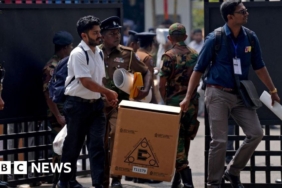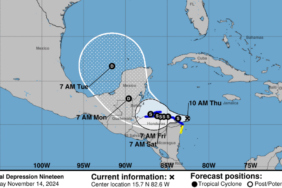This content discusses the potential impact of a second Donald Trump presidency on Asia’s relations with the United States. It highlights Trump’s past actions during his first term, such as launching a trade war with China and engaging with diplomatically isolated leaders in Asia. The content also explores the potential consequences of Trump’s proposed protectionist economic agenda, including increased tariffs that could affect trade-dependent economies in the region. The reactions of Asian leaders and analysts to the possibility of a second Trump term are also mentioned, emphasizing concerns about economic uncertainty and the potential for reduced GDP growth. Bu içerikte, ABD Başkanı Trump’ın ticaret politikaları ve dış politika yaklaşımlarına odaklanılmaktadır. Ticaret politikalarında tarifelerin önemli bir rol oynadığı belirtilmektedir ve Trump’ın bu konudaki tutumunun diğer alanlara göre daha tutarlı olduğu vurgulanmaktadır. Asya iş liderlerinin, Trump’ın politikalarının olası sonuçlarına karşı plan yapmaları gerektiği belirtilmektedir. Ayrıca, Trump’ın geleneksel ittifaklar ve ortaklıklara yönelik tutumundaki belirsizlikler ve özellikle Tayvan konusundaki yaklaşımı ele alınmaktadır. Trump’ın Asya’da izlediği politikaların Çin’in diplomatik etkisini artırabileceği ve bölgede dengeleri değiştirebileceği üzerinde durulmaktadır. Son olarak, Trump’ın Kuzey Kore lideri Kim Jong-un ile olan diyaloğu ve Kuzey Kore’ye yardım etme çabaları da ele alınmaktadır.
Kaynak: www.aljazeera.com
Taipei, Taiwan – Asia is bracing for a second Donald Trump presidency that is poised to inject unpredictability into the region’s relations with the United States, from casting doubt on longstanding alliances to threatening to upend trillions of dollars in trade.
During his first term as president from 2016 to 2020, Trump, who scored a decisive victory against Kamala Harris in Tuesday’s election, broke with many of the longstanding but unspoken rules of US foreign policy.
He launched a trade war with China in 2018 – at a time when many countries were still courting its favour – and engaged with two of Asia’s most diplomatically isolated leaders, North Korea’s Kim Jong Un and Taiwan’s then-President Tsai Ing-wen.
In his second term, Trump has promised to implement an even more aggressive version of his “America first” vision, including a protectionist economic agenda that would raise tariffs to levels not seen since the Great Depression of 1929-1939.
“A second Trump term would move beyond the targeted tariffs of his first to a much broader target base, both within China and globally,” Steve Okun, founder and CEO of Singapore-based APAC Advisors, told Al Jazeera.
Indian Prime Minister Narendra Modi was among the first leaders in the region to congratulate Trump on his victory on Wednesday, saying he was looking forward to “renewing our collaboration”.
China’s Ministry of Foreign Affairs earlier expressed hope for “peaceful coexistence” with the US as Trump appeared on the verge of securing the needed 270 electoral college votes.
“We will continue to approach and handle China-US relations based on the principles of mutual respect, peaceful coexistence, and win-win cooperation,” Foreign Ministry spokeswoman Mao Ning told a regular briefing.

US relations with China, which deteriorated during Trump’s first term and have remained strained under President Joe Biden, are likely to worsen further if the former president follows through on his plans to impose a tariff of at least 60 percent on Chinese imports.
“Turbulence between the US and China is going to be one of the stories to watch, and of course, this could have ripple effects for the wider region and wider regional China-linked supply chains,” Nick Marro, principal economist for Asia at the Economist Intelligence Unit, told Al Jazeera.
Over the past eight years, the US has moved to untangle itself from its close economic relationship with China, with much of Asia caught in the middle of a game of push and pull between the world’s largest and second-largest economies.
Behind the scenes, leaders across Asia are likely to be worried about Trump’s economic agenda.
Apart from China, the region is home to many of the world’s most trade-dependent economies.
Southeast Asia, for example, has an average trade-to-gross domestic product (GDP) ratio of 90 percent, double the global average, according to the Hinrich Foundation, a trade-focused philanthropic organisation based in Singapore.
In addition to tariffs on China, Trump has also proposed a blanket tariff of 10-20 percent on all foreign goods.
Those measures would affect export-led economies across the region, including friendly and allied jurisdictions such as South Korea, Japan, Taiwan and Vietnam.
Oxford Economics, a consultancy firm, has estimated that “non-China Asia” would see its exports and imports fall by 8 percent and 3 percent, respectively, under the most conservative version of Trump’s plans.
Analysts at the London School of Economics and Political Science have predicted that Trump’s tariffs would lead to a 0.68 percent reduction in China’s GDP and GDP losses of 0.03 percent and 0.06 percent, respectively, for India and Indonesia.
Last week, the head of Singapore’s sovereign wealth fund, Rohit Sipahimalani, issued a rare warning about Trump’s plans, saying tariffs could “create uncertainty” and “impact global growth”.
Marro said he expects Trump to move quickly on trade once he re-enters the Oval Office.
“The timeline we are looking at is the first 100 days in office. Tariffs are one part of his policy focus that he hasn’t really deviated from the time he’s been in office and the time he has been on the campaign trail,” Marro told Al Jazeera.
“Given this is one area of policy consistency suggests that we could see a bit more rapid movement than in other areas.”
Isaac Stone-Fish, the CEO and founder of Strategy Risks, said Asian business leaders would need to start planning for any outcomes.
“Companies and regulators throughout Asia need to understand that this will raise the cost of trade with China and that they need to have a better understanding of how to manage their China exposure,” Stone-Fish told Al Jazeera.

Another source of uncertainty is Trump’s ambivalence towards traditional alliances and partnerships with countries such as Japan and South Korea, which he has accused of freeloading on Washington’s military protection.
“Trump’s victory raises the likelihood that American foreign policy will pivot away from ‘values-based diplomacy,’ or collaborating with allied countries holding similar values in a struggle with China and Russia, and toward a unilateral pursuit of the exclusive interests of the US,” South Korea’s Hankyoreh newspaper said in an editorial on Wednesday.
“The South Korean government will need to maximise communication to minimise the ‘Trump risk’ while shifting toward a more pragmatic foreign policy that prioritises the national interest over values.”
Trump’s perceived reluctance to use US military power to defend partners from aggression has attracted particular attention in the case of Taiwan.
While the US and Taiwan do not have formal diplomatic relations, Washington is its main security guarantor and committed through the 1979 Taiwan Relations Act to help the self-ruled island defend itself.
Since 1950, Washington has sold nearly $50bn in defence equipment and services to Taiwan, according to estimates from the US-based Council on Foreign Relations.
Trump has criticised Taiwan for “stealing” the global chip industry from the US and not paying Washington for its defence, but has also threatened to impose steep tariffs on China if it moves to invade the island, which Beijing considers its territory.
During his first term in office, Trump broke with decades of US protocol by accepting a phone call from Taiwan’s then-President Tsai, who congratulated him on his election victory.
His administration also pursued a closer relationship with Taipei generally, but avoided inking a free trade deal that could have angered Beijing.
Yang Kuang-shun, a co-founder of the Taipei-based US Taiwan Watch, said Taiwan should make a case early to Trump that the island is a reliable partner and worthy of his attention.
“Taiwan needs to make a very strong, bold move to convince Trump … Taiwan is willing to shoulder its burdens and to pay more for its own defence, and also show it’s willing to work with America and encourage more Taiwanese business to invest in America,” Yang told Al Jazeera.
Stone-Fish said Asian countries that rely on Washington for their defence, including Japan and South Korea, would need to make their case to the new president.
“A Trump presidency means that Japan and Taiwan need to show — early and often — to Trump and Trump officials why US troops in the region are key. And hopefully, Trump and his team will listen,” he said.

Some analysts also believe that Trump’s more isolationist “America-first” approach to foreign policy could give Beijing a diplomatic leg up in the region, which critics say the Republican allowed during his first term.
In 2017, Trump withdrew the US from the Transpacific Partnership, a 12-member trade deal that at the time represented 40 percent of global trade. In its place, Beijing successfully introduced its Regional Comprehensive Economic Partnership.
The 15-member partnership is currently the world’s largest trade deal by GDP.
During Trump’s first term, Beijing also scooped up five of Taiwan’s dwindling list of diplomatic allies – Sao Tome and Principe in 2016, Panama in 2017, and the Dominican Republic, Burkina Faso and El Salvador in 2018. Taipei lost two – Nicaragua and Nauru – under Biden.
Despite his isolationist instincts, Trump has also shown a willingness to engage in diplomacy in unorthodox ways, most notably in the case of his summits with North Korea’s Kim.
In 2018, he became the first sitting US president to hold talks with a North Korean leader when he met Kim in Singapore.
He followed up that meeting with two more, one of which saw him briefly step on North Korean soil, another first for a US leader.
At the start of the COVID-19 pandemic, Trump reportedly sent Kim coronavirus tests, according to legendary journalist Bob Woodward’s latest book.
Four years later, Trump’s openness to engaging with the North Korean dictator does not appear to have changed.
Speaking at the Republican National Convention in July, Trump said he “got along very well” with Kim.




Yorumlar kapalı.